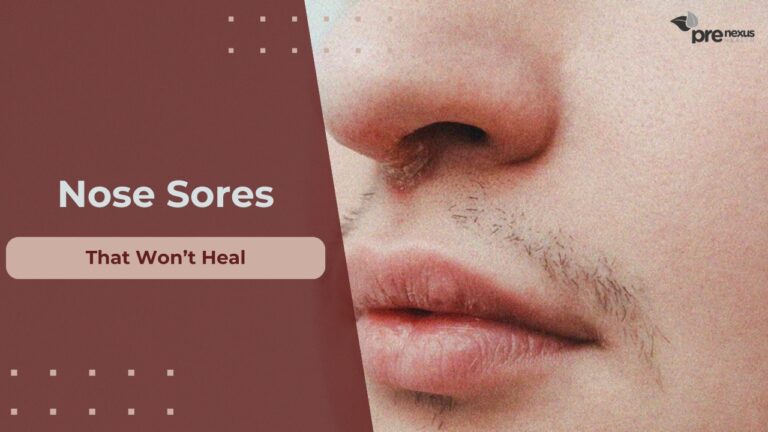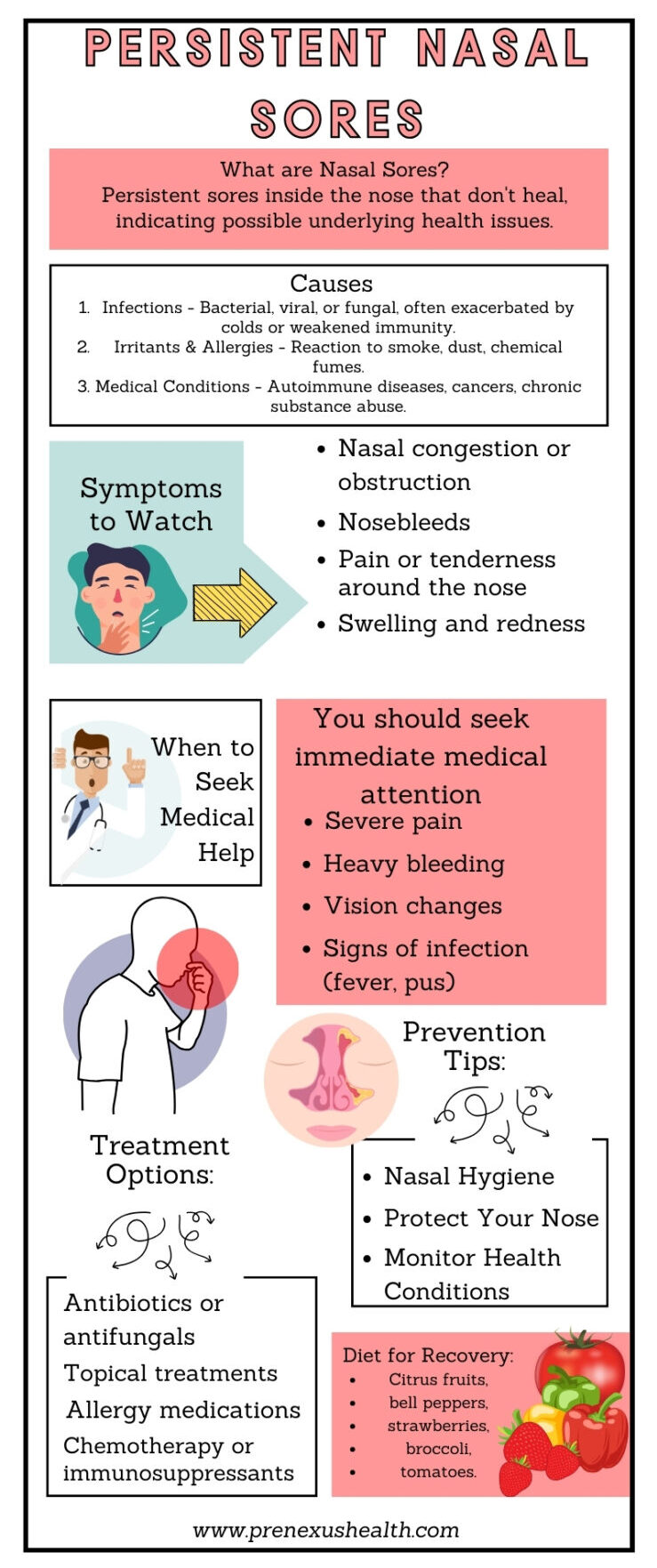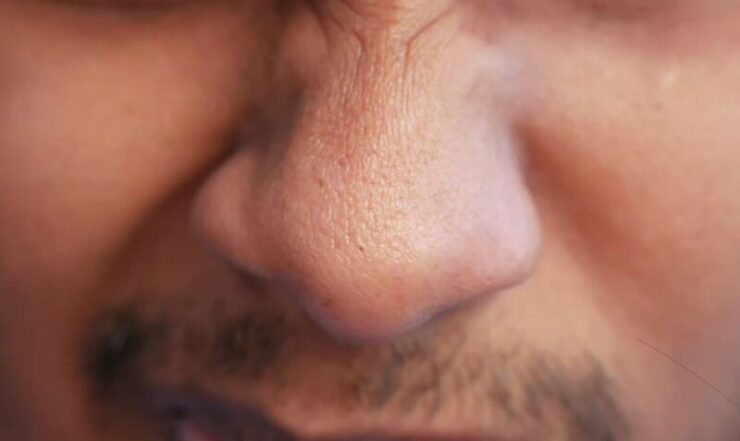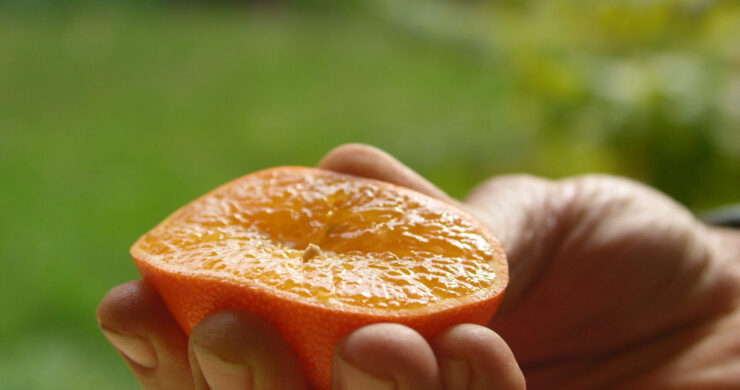Sores inside the nose are relatively common, typically due to minor irritations or colds. However, when these sores persist without healing, it could signify a more serious underlying condition. The ones that won’t heal can be annoying and even painful, but more importantly, they can potentially affect your overall health.
This article will guide you through the understanding of this condition, its potential causes, signs to watch out for, diagnostic processes, treatments, and preventive measures.
Common causes
1. Nasal infections
Nasal infections are one of the leading causes of sores that don’t seem to heal. These can be bacterial or viral and often result from a simple cold that is exacerbated due to improper treatment or a weakened immune system. Fungal infections, though less common, can also cause persistent nose sores.
2. Irritants and allergies
Various irritants, including smoke, dust, or chemical fumes, can lead to the development of nose sores. Additionally, allergic reactions may cause sores to persist, particularly if the person is continually exposed to the allergen.
3. Other medical conditions
More complex medical conditions like autoimmune diseases (lupus or Wegener’s granulomatosis), certain types of cancers, and even chronic cocaine use may result in nose sores. Such conditions often require specialized medical interventions.
Symptoms to look out for
While a non-healing sore is itself a cause for concern, other symptoms can accompany it. These may include:
- Nasal congestion or obstruction
- Nosebleeds
- Pain or tenderness around the nose
- Swelling or redness
When to seek medical attention?
You should seek immediate medical attention if the sore is accompanied by severe pain, heavy bleeding, vision changes, or signs of infection like fever and excessive pus discharge. Untreated or poorly managed nose sores can lead to secondary infections, like cellulitis or sinusitis, which may require more intensive treatment.
Diagnosis and treatment
To diagnose the cause of the persistent nose sore, the doctor may ask about your medical history, conduct a physical examination, and order laboratory tests or imaging studies if necessary. Biopsies may be required in cases where malignancies are suspected.
Common treatments
Treatment largely depends on the underlying cause. Some common treatments include:
- Antibiotics or antifungal medications for infections
- Topical treatments for local sores
- Allergy medications for allergies
- Specialized treatments like chemotherapy or immunosuppressants for cancers or autoimmune diseases
Prevention measures
1. Regular hygiene practices
Maintaining good nasal hygiene is a crucial step in preventing nose sores. This includes not picking your nose and washing your hands regularly to avoid introducing bacteria into your nostrils. Using a humidifier, especially during dry seasons, can also keep your nasal passages moist and prevent sores.
Keep in mind that even dealing with stuff like getting rid of blackheads is super important for keeping your skin in good shape. It’s all about making sure your face stays clear and your pores don’t get all blocked up.
2. Protect your nose
Avoid prolonged exposure to irritants like smoke, dust, or strong chemical fumes. If you can’t avoid these, consider wearing a mask or a respirator to protect your nose.
3. Monitor health conditions
For individuals with allergies or underlying health conditions, regularly monitoring your condition and strictly following the treatment plan can prevent nose sores from forming or becoming persistent.
Lifestyle modifications for recovery
Dietary considerations
Maintaining a balanced diet rich in vitamins and minerals can help the body repair itself. Nutrients like Vitamin C, known for its healing properties, can be beneficial.
- Citrus fruits (oranges, grapefruits)
- Bell peppers
- Strawberries
- Broccoli
- Tomatoes
Also, staying hydrated can keep your body functioning optimally and promote healing. Aim to drink at least 8 cups of water a day.
FAQs
Can using a humidifier prevent the formation of nose sores?
Yes, using a humidifier, especially during dry seasons, can help keep your nasal passages moist and may prevent the formation of nose sores by reducing dryness and irritation in the nose.
Can stress affect the healing of nose sores?
Stress can impact the body’s healing process and immune response, potentially slowing the healing of nose sores. Managing stress through techniques like meditation, exercise, and sufficient rest can promote healing.
Are there any specific exercises to avoid when dealing with a persistent nose sore?
It’s advisable to steer clear of strenuous activities that may exacerbate your condition or divert your body’s energy away from healing the nose sore.
How does poor nasal hygiene contribute to the development of nose sores?
Poor nasal hygiene, such as picking your nose or not washing your hands regularly, can introduce bacteria into your nostrils, leading to infections and sores. Maintaining good nasal hygiene is crucial in preventing these issues.
I’m a dermatologist who loves studying and treating skin (obviously). I went to medical school and chose dermatology because I wanted to help people with skin problems. I’m dedicated to helping people feel better about their skin (and in it).









